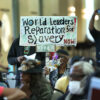NEW YORK – New York City Council members passed legislation Thursday aimed at acknowledging, studying and addressing the impact of slavery and racial injustices in New York City.
New York City had one of the highest rates of slave ownership in the country during the 1700s, according to the City Council.
One of four bills establishes a task force to consider the creation of Freedom Trails in the city. Another would require the installation of signage near Wall and Pearl Streets, to mark the site of New York’s first slave market.
“As so many places across the country are choosing to ignore and suppress our history rather than teach it, it’s vital that New York City grapple with and learn from the parts of our past we too often try not to think about,” said Public Advocate Jumaane Williams. “The wealth of Wall Street banks was built on the backs of the human beings sold on that very spot, and we have a moral obligation to accurately acknowledge not only this slave market’s tragic history, the pain of enslaved people in our city, and the role slavery had in New York’s economy, one which has echoed painfully across generations.”
Establishing the ongoing legacies of slavery in New York City is part of the bill Councilmember Crystal Hudson introduced, which calls for a “truth, healing and reconciliation process.” It would also protect and acknowledge those affected, and recommend changes to prevent the recurrence of injustices.
“The harm slavery caused Black Americans continues to be felt today,” Hudson said.
Bill mandates study on reparations
Councilmember Farah Louis’ bill mandates a study on reparations, both monetary, and non-monetary.
“Financial restitution is not what we’re doing right now. It’s about having a conversation, putting together a committee,” Louis said. “They should trust the process.”
City Council Speaker said the legislation should’ve happened a long time ago, and the bills “rightfully wraps justice into one package.”
“In this surrounding area, people of African descent were brought to these shores, sold, trafficked and worked to build this city that we so love,” Brooklyn NAACP president L. Joy Williams said.
“I want reparations in my lifetime,” 94-year-old Crown Heights resident Ammiebelle Bush Olatunji said at City Hall. “It means everything.”
The bill now heads to Mayor Eric Adams’ desk. The sponsors of the legislation say they “hope and anticipate” he will sign it.
“New York City has a moral obligation to confront its historical role in the institution of slavery, including harms and long-lasting consequences. This is another crucial step towards addressing systemic inequities, fostering reconciliation, and creating a more just and equitable future for all New Yorkers,” a City Hall spokesperson said.
New York City plans to work with the state, which already established its own commission on reparations remedies.



